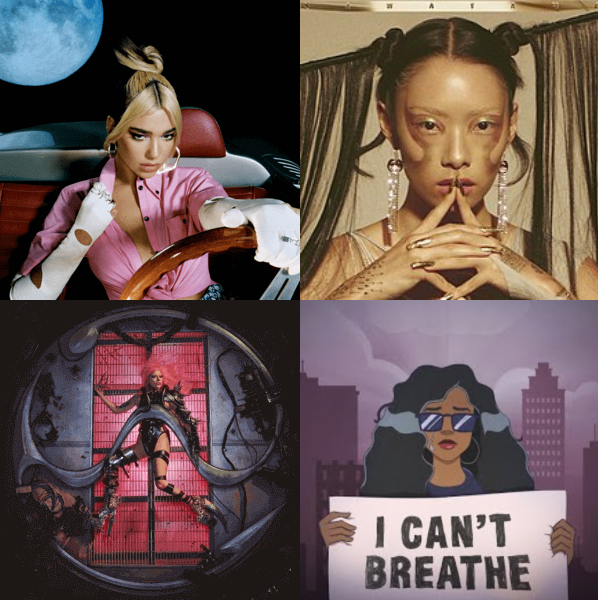So far, 2020 has been an eventful year marked by a plethora of social and political upheaval. In light of these societal changes, the music community, especially female artists, has lent their voice and artistic perspective to the current situation. From messages of self-confidence and positivity, to calls of action and unity in the midst of a pandemic and racial injustice, these womxn successfully create an artistic dialogue with their works. Without further ado, let us dive into some of the most notable musical releases by womxn in 2020.
Dua Lipa “Future Nostalgia,” Mar 27 2020
Dua Lipa returns stronger than ever, both in terms of vocal technique and attitude. Her latest release draws the listener into a futuristic world while still featuring sounds reminiscent of 80s synthwave — exactly what the album’s paradoxical title suggests. This contrasts with Lipa’s earlier releases, which take on a more mainstream pop sound. The title track “Don’t Start Now” features an upbeat sound as Lipa sings about moving on from an overly clingy ex, and strongly declares her independence. Throughout the remainder of the album, a wide variety of sounds are explored, from tracks with relaxed basslines (“Pretty Please”) to more powerful and pumped-up anthems (“Physical”). “Boys will be Boys,” Lipa’s final track, takes on a more contemplative tone as it calls out the hypocritical attitude society has towards women’s behavior. The phrase in the hook “boys will be boys, and girls will be women” highlights the harmful double standards of forcing women to take on heavier emotional responsibilities than men. Overall, the album showcases Lipa’s versatility through songs with much more contrasting styles.
Favorite Songs: “Break My Heart,” “Don’t Start Now,” “Pretty Please”
Rina Sawayama “Sawayama,” Apr. 17 2020
British-Japanese pop star Rina Sawayama released her eponymous album which grapples with diverse themes such as homesickness (“Akasaka Sad”), xenophobia (“STFU!”) and toxic masculinity (“Comme des Garçons”). In particular, the pre-release single “Chosen Family” speaks out as the singer’s message of solidarity with her fellow members of the LGBT+ community, and serves as an uplifting statement for the community. Filled with experimental melodies and haunting basslines, Sawayama includes an eclectic range of genres, drawing heavy inspiration from J-Rock, in this album. For instance, the dissonant rock guitar and powerful drum beats in “STFU!” contrast with the majestic orchestral atmosphere of “Dynasty.” The songs also seem to reflect a coming-of-age story arc, and together with Sawayama’s uniquely rich voice, intrigue the listener and bring them in for a ride.
Favorite Songs: “Chosen Family,” “Akasaka Sad,” “Paradisin’”
Lady Gaga “Chromatica,” May 29 2020
Lady Gaga’s much-anticipated 6th studio album “Chromatica” features avant-garde sounds, transporting the listener into a fantastic world filled with addicting dance-hall beats and neon lights. Gaga continues to impress us all with her powerful vocals and strong persona, which appears throughout the album, while discussing heavy subject matter such as relationship trauma and mental health. “Chromatica” also includes collaborations between Gaga and other just as high-profile artists around the world: Blackpink, a worldwide sensation and K-pop girl group; Elton John, veteran British pop legend; and Ariana Grande, American pop culture icon. In particular, “Sour Candy,” a 90s-inspired track featuring Blackpink, showcases a sultry chorus, contrasting with bright and youthful verses. In summary, “Chromatica” carries on the legacy of Lady Gaga and exemplifies yet again her signature sound.
Favorite songs: “911,” “Sour Candy,” “Enigma”
H.E.R. “I Can’t Breathe,” Jun 19 2020
One of H.E.R.’s latest singles, this heart-wrenching song is a direct reference and response to George Floyd’s killing at the hands of police. The first two verses lament the lack of love and empathy that people have for each other, asking, “Where is the hope and the empathy?” and emotionally drawing the listener into the rest of the song. Following that, the third verse is recited like a poem, bluntly stating the racial conflict that America faces and calling out the ignorance towards racial minorities. Paired with a simplistic acoustic beat, “I Can’t Breathe” lends its voice to the current ongoing historical dialogue, speaking on behalf of womxn of color.
Overall, despite these artists’ diverse backgrounds and musical styles, their newest releases share something in common: they all serve as critiques of society from four different womxn’s points of view.
Contact Audrey Liu at 21audreyl ‘at’ students.harker.org.
